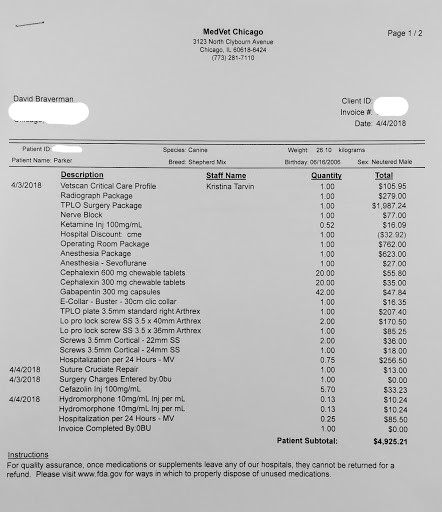Before everything descends into 18 hours of post-election punditry and chaos, a quick update on the dog.
Last week he developed an infection around the site of his April surgery, complete with oozing drainage channel just below his knee. After a couple days of antibiotics, he's stopped oozing. We met with his surgeon today, and she said that the infection is in retreat, so he probably won't need additional surgery to pull the plates out. We'll continue antibiotics for three more weeks and I'll keep an eye on his knee through the end of the year.
The surgeon also hypothesized that the proximate cause of the infection was, ironically, his teeth-cleaning last month. She said she has observed cases where mouth bacteria can get into the bloodstream during cleaning, and interfaces between surgical steel and bone make good hiding places for them.
Fortunately, at 12½ years old, Parker will probably never have his teeth cleaned again—at least not by a vet while under anaesthesia.
So, Parker is fine, with no further ill effects except for another few days with the cone.
The Economist's Gulliver blog this morning asked exactly the same question I did when I woke up: how likely is it to get ill from flying on an airplane? Not very:
Planes are widely regarded as flying disease-incubators. If one passenger is sick with a contagious disease and coughing those germs into the air, it makes sense for fellow-flyers to feel that the germs will simply be inhaled by everyone else on the flight, since there is nowhere else for the things to go.
In reality, though, the situation is not that bad. Allen Parmet, a former US Air Force flight surgeon who serves as an aerospace medicine consultant, explained recently to The Verge, a technology and science news site, that infections actually don’t spread well on planes. The reason is the very dry air in the cabin. Many bacteria die in the low humidity. As for viruses, they travel on water droplets when a person coughs or sneezes. But these water droplets also evaporate in the low humidity, and the plane’s fast airflow from ceiling to floor prevents them from travelling far.
[M]ost viruses take days to show symptoms, and there were indications that the illness was contracted by people before they boarded the plane. This tale will probably end the usual way. A few passengers, by the laws of probability, will get sick in the coming week, and they will assume it had something to do with all the germs floating around the plane. It may not be true, but it is for them a satisfying enough explanation.
Well, sure, but I swear the dozen or so babies and toddlers running around (literally) my cabin earlier this week may have contributed to how I felt today.
A predicted consequence of anthropogenic climate change is that the air won't cool as quickly overnight, leading to ever-increasing temperatures overall. It's happening, and it's dangerous:
Nationwide, summer nights have warmed at nearly twice the rate of days, with overnight low temperatures increasing 0.8°C per century since 1895, when national temperature records began, compared to a daytime high increase of 0.4°C per century. (Nights have warmed faster than days during other seasons, too.)
While warm summer nights may seem less concerning than scorching afternoons, “the combination of high daytime and high nighttime temperatures can be really lethal because the body doesn’t have a chance to cool down during the nighttime hours,” said Lara Cushing, professor of environmental epidemiology at San Francisco State University.
Those risks are higher in places where temperatures have historically been cooler, like coastal California. There people are less physiologically acclimated (the body can get used to higher temperatures up to a point) and less behaviorally adapted to hot weather.
“A hundred and five degrees in San Francisco is going to have a bigger impact probably than 105 degrees in Houston, Tex., where everybody has air conditioning and people are accustomed to dealing with high temperatures,” Dr. Cushing said.
Older people, the sick, and young children are especially at risk. So are agricultural, construction and other outdoor workers, who can no longer avoid the heat by shifting their hours to work earlier or later in the day. Similarly, homeless people who bear the full brunt of the elements get little relief.
Never mind the rest of the local environment. Slower overnight cooling puts stress on plants as well.
In the 7 days through yesterday, I walked 169,083 steps, a new personal record (PR). That averages out to 24,154 per day.
On the one hand, I can set a new PR of 25,000 per day, or 175,000 for 7 days, by walking 22,149 steps today.
On the other hand, or if the shoe is on the other foot so to speak, my feet do not like this idea. Nor do my calves, quads, hams, or glutes.
On the third hand, if I don't hit that PR today, I won't have another shot at it without either walking 25k consistently for a week, or doing another pair of stupidly long walks within a 7-day period. Now, it's entirely possible I'll hit 50k in one day sometime this summer. But after all the walking I've done this week, I'm not that excited by the prospect.
So: any steps I get above 16,289 for today will set a 7-day PR, which is great. But I'm not going to take that in stride.
Also, yesterday bumped up into my top-5 days. Pretty soon they're all going to be over 35,000 steps:
My top-5 single-day step records are now:
We just got back from the vet. The x-rays show that Parker's leg is almost completely healed, so he's finally cleared to go back to his play group. He has no idea about this right now but tomorrow morning he'll be very, very happy.
Now I'm about to run to my office, so I'm queuing up these articles to read later:
OK. Chugging some tea, and hitting the CTA. More later.
Yesterday Parker got fitted for a new E-collar after I discovered that his long nose and long tongue were just long enough to lick his sutures. Fortunately the incision doesn't seem irritated or infected, probably owing to the massive doses of antibiotics we've got him on.
As for the primary injury, that seems to have healed remarkably well in the few days since his surgery. He's putting more weight on the leg, and has less trouble standing up. He still seems a little shaky in some postures, particularly squatting.
So Parker's biggest problems right now are bumping into things with his Cone of Shame, and the abject boredom of a smart dog getting only 15 minutes of walkies a day.
He's really going to hate this coming week, too. I've got rehearsals or performances every single evening, so he'll be alone most of the time. Poor dude.
(There is no A-to-Z post today because it's Sunday.)
Parker is both feeling a lot better and a lot worse.
In the "better" column we have his incision looking great, him putting more weight on the repaired leg, and him figuring out how to navigate with the Cone of Shame.
In the "worse" column we have listlessness, sleep disruption, and depression from the drugs, the lack of exercise, and the Cone of Shame. His surgeon followed up with me yesterday and said this is perfectly normal.
I'm still watching him closely, but I'm happy how things are going. He gets his sutures out and the cone off a week from Wednesday. I think he can make it fine.
Cone of shame, shaved leg, drugged out of his mind: that's my boy. But at least he's home:

As I've been saying, the next few weeks will be rough. But he's going to get lots of attention, especially between now and Monday.
And then there's this:

He has physical pain, I have psychic pain. All because he ran up some stairs too fast.
Again: ouch.
Whew. Parker is just fine.
The surgeon said everything went very well. She reported he completely tore his meniscus and his right CCL (the doggy equivalent of a human's ACL), and it looked like the result of an acute injury, not age-related deterioration. This is good news because it means he has a much lower risk of doing this to his left leg than we worried about.
He's recuperating from the operation right now and will remain overnight for observation. He should be home after lunch tomorrow, with a healthy quantity of drugs and probably a really sharp appetite.
Recovery should take 6-8 weeks, though he should be able to go for actual walks within about 2 weeks. But wow, he's not going to like those two weeks.
Stay tuned. Photo tomorrow, I expect.
Parker did not have a good morning.
I woke him up early, then "forgot" to feed him, and wouldn't even let him lick the cream cheese off my knife when I had a bagel right in front of him. All he got was an unpleasant-tasting amino supplement and a pain pill.
He did get a ride in the car, though, which might have gotten his mind off his appetite.
But then he got unceremoniously carried up two flights of stairs (the elevator at the pet hospital was out of order) and handed off to someone who smelled like frightened cats.
Let's not even talk about the thunderstorms forecast for later today.
So, Parker is chilling at the hospital right now, with his surgery scheduled for this afternoon. Because he's in the late group, I won't get to visit him tonight, which is probably OK because that might just upset him. He should be ready to go home tomorrow late morning.
I'll post again when the surgeon calls after the operation.